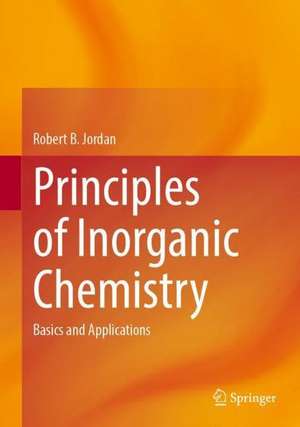Principles of Inorganic Chemistry: Basics and Applications
Autor Robert B. Jordanen Limba Engleză Hardback – 23 apr 2024
Preț: 940.25 lei
Preț vechi: 1146.65 lei
-18% Nou
Puncte Express: 1410
Preț estimativ în valută:
179.97€ • 195.56$ • 151.28£
179.97€ • 195.56$ • 151.28£
Carte tipărită la comandă
Livrare economică 21 aprilie-05 mai
Preluare comenzi: 021 569.72.76
Specificații
ISBN-13: 9783031229251
ISBN-10: 3031229258
Pagini: 937
Ilustrații: XIX, 937 p. 608 illus., 272 illus. in color.
Dimensiuni: 178 x 254 mm
Greutate: 1.86 kg
Ediția:2024
Editura: Springer International Publishing
Colecția Springer
Locul publicării:Cham, Switzerland
ISBN-10: 3031229258
Pagini: 937
Ilustrații: XIX, 937 p. 608 illus., 272 illus. in color.
Dimensiuni: 178 x 254 mm
Greutate: 1.86 kg
Ediția:2024
Editura: Springer International Publishing
Colecția Springer
Locul publicării:Cham, Switzerland
Cuprins
Atoms and Electrons.- The Periodic Table.- Covalent Bonding Theories.- Energy.- Acids and Bases.- Reaction Types and Mechanisms.- The Solid State and Symmetry.- Introduction to Transition Metals.- The Transition Metals: Groups 3–12.- Organometallic Chemistry of Transition Metals.- The Lanthanides.- Groups 1 & 2.- Group 13.- Group 14.- Group 15.- Group 16.- Group 17.- Group 18.- Bioinorganic Chemistry.- Nanomaterials.
Notă biografică
Robert B. Jordan received an Honors B.Sc. in chemistry from the University of Western Ontario, now Western University, in 1961 and proceeded to postgraduate work at the University of Chicago under the inspiring direction of Professor Henry Taube (Nobel Prize 1983). In 1962–63, he moved with Professor Taube to Stanford University to complete his postgraduate research for which he was awarded a Ph.D. from the University of Chicago in 1964. This was followed by a postdoctoral appointment with Professor John. P. Hunt at Washington State University, where he learned the basics of NMR in paramagnetic systems, with the assistance of Professor Harold Dodgen, and met his future wife. He was appointed as Assistant Professor in Chemistry at the University of Alberta in 1965, where he continued to serve until retirement in 2005. During this time, he was promoted to Associate and then Full Professor in 1971 and 1978, respectively, and was Department Chairman from 1984 to 1989. The help of many graduate students and several collaborators resulted in the publication of 132 papers. He also authored the book titled "Reaction Mechanisms of Inorganic and Organometallic Systems" which has been published in three editions in 1991, 1998, and 2007.
Textul de pe ultima copertă
This textbook provides a current and comprehensive coverage of all major topics of inorganic chemistry in a single source. It includes an analysis of the sources and preparations of the elements, their common compounds, their aqueous speciation, and their applications, while it also discusses reaction pathways and mechanisms. It includes up-to-date material, supported by over 4000 references to the original literature and to recent reviews that provide more detailed information. The material is accompanied by over 250 figures and three-dimensional representations, based on published structural details. Each chapter has worked examples and problems, with multiple inserts describing topical issues related to the material in the text. The textbook provides the instructor with a wide range of areas that can be selected to meet the background and interests of the students, while selected chapters are relevant to courses on more specialized topics, such as inorganic materials, bioinorganic chemistry, and nanomaterials. The intended readers are students, lecturers, and researchers who need a source for the current status of the area.
Caracteristici
Covers fundamental laws and applications Emphasizes reaction pathways and aqueous speciation Includes worked examples and problems to facilitate learning Request lecturer material: sn.pub/lecturer-material
